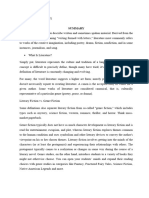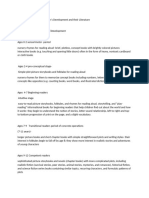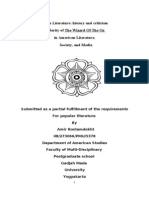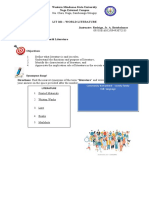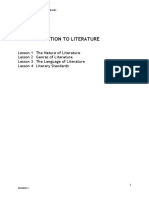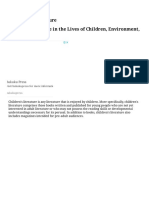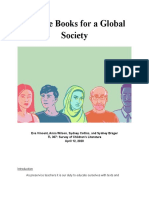0 ratings0% found this document useful (0 votes)
Elt 4
Uploaded by
Leovie CagbayLiterature is an important part of society that allows people to learn empathy, understand different perspectives, and escape from reality. While technology has changed how we read, literature still reflects human nature and allows readers to immerse themselves in different minds and time periods. Reading literature from the past teaches us about history and sparks creativity. Several factors influence what literature is selected for teaching, including maintaining relevance, students' ability to relate to the content, literary merit, and whether works are required or optional choices. Literature provides knowledge, entertainment, and new perspectives that enrich our lives.
Copyright:
© All Rights Reserved
Available Formats
Download as DOCX, PDF, TXT or read online from Scribd
Download as docx, pdf, or txt
Elt 4
Uploaded by
Leovie Cagbay0 ratings0% found this document useful (0 votes)
Literature is an important part of society that allows people to learn empathy, understand different perspectives, and escape from reality. While technology has changed how we read, literature still reflects human nature and allows readers to immerse themselves in different minds and time periods. Reading literature from the past teaches us about history and sparks creativity. Several factors influence what literature is selected for teaching, including maintaining relevance, students' ability to relate to the content, literary merit, and whether works are required or optional choices. Literature provides knowledge, entertainment, and new perspectives that enrich our lives.
Original Description:
elt4
Original Title
ELT 4
Copyright
© © All Rights Reserved
Available Formats
DOCX, PDF, TXT or read online from Scribd
Share this document
Did you find this document useful?
Is this content inappropriate?
Literature is an important part of society that allows people to learn empathy, understand different perspectives, and escape from reality. While technology has changed how we read, literature still reflects human nature and allows readers to immerse themselves in different minds and time periods. Reading literature from the past teaches us about history and sparks creativity. Several factors influence what literature is selected for teaching, including maintaining relevance, students' ability to relate to the content, literary merit, and whether works are required or optional choices. Literature provides knowledge, entertainment, and new perspectives that enrich our lives.
Copyright:
© All Rights Reserved
Available Formats
Download as DOCX, PDF, TXT or read online from Scribd
Download as docx, pdf, or txt
0 ratings0% found this document useful (0 votes)
Elt 4
Uploaded by
Leovie CagbayLiterature is an important part of society that allows people to learn empathy, understand different perspectives, and escape from reality. While technology has changed how we read, literature still reflects human nature and allows readers to immerse themselves in different minds and time periods. Reading literature from the past teaches us about history and sparks creativity. Several factors influence what literature is selected for teaching, including maintaining relevance, students' ability to relate to the content, literary merit, and whether works are required or optional choices. Literature provides knowledge, entertainment, and new perspectives that enrich our lives.
Copyright:
© All Rights Reserved
Available Formats
Download as DOCX, PDF, TXT or read online from Scribd
Download as docx, pdf, or txt
You are on page 1/ 2
The importance of literature in a 21st century world
Literature is a timeless piece of entertainment. As the innovations of technological advancements
have grown, the way we read has revolutionized and evolved. However, the essence of
storytelling and the effect it has on our lives hasn’t wavered.
Literature reflects human nature and a way we can learn and relate to others. By reading through
a first-person perspective, we can fully immerse ourselves into a different mindset and figure out
how others think and feel. This is important within today’s society as we’re becoming
increasingly detached from human interaction through iPhones, FaceTime, and social media.
Literature is something that will never change in the way it makes you feel, regardless of
whether that’s on paper or as an eBook.
Sparks empathy and understanding
Reading a book is one of the best ways to fully immerse your mind into another person’s
dialogue and experiences. Being able to empathize and understand other people’s feelings is a
key aspect of helping you connect to different regions, races, societies, and periods of time. They
help a person take a closer look at the different facets of living aside from what they know and
live which can change perspectives.
Learn about past lives
History plays a fundamental role in shaping literature, every novel, play, or poem you read has
been influenced by political context, or a time period, or a relationship from the time it was
written.
Not forgetting the pure history of literature itself with the first novel being penned in 2000 BC -
The Epic of Gilgamesh. Being able to read first-hand something from so long ago is a major
aspect of learning the lives of historical figures and times.
Escapism and possibilities
Reading can take us into different realms and see other people’s creative thought processes.
Whether it’s flying into Neverland, wandering through Middle Earth, battling at Hogwarts, or
rafting through the Mississippi River with Huck and Jim - books can take you anywhere and any
place. This is an amazing tool that few entertainment mediums can truly give you and one of the
reasons why literature is so beautiful. Whether you’re having a bad day, stressed out with work,
dealing with new life decisions - books can help you escape into another world and live
somewhere else for a short amount of time.
Novels provide knowledge, entertainment, encourage creativity and offer an escape for readers -
enriching our lives in more ways than one. It is definitely much more than words in a book, and
even with the increasing popularity of eBooks, Kindles, Wattpad, and online reading they create
a conversation, a unique world, and new perspectives.
Factors Affecting Interests in Literature
Contemporary . Maintaining currency is a common focus across many disciplines and literature
selection is no different. The focus of curriculum selection has continued to change alongside
society.
Ability to Relate to Students. Students are more engaged in their learning if they find it
interesting or relatable.
Literary Merit. Literary merit is the quality of the literature that makes it valuable enough to
teach.
Choice vs. Requirement. Deciding whether to make a novel required reading or give students a
choice of options was frequently discussed by teachers as a factor influencing their selection.
Burke (20130 lists some factors as follows:
Entertains the reader and is interesting to read.
Does not merely conform to the expectations of a single genre or formula.
Has been judged to have artistic quality by the literary community (teachers, students, librarians,
critics, other writers, the reading public).
Has stood the test of time in some way, regardless of the date of publication.
Shows thematic depth: The themes merit revisiting and study because they are complex and
nuanced.
Demonstrates innovation in style, voice, structure, characterization, plot, and/or description.
May have social, political, or ideological impact on society
Does not fall into the traps of “pulp” fiction such as clichéd or derivative descriptions and plot
devices, or sentimentality rather than “earned” emotion.
Is intended by the author to communicate in an artistic manner.
Is universal in its appeal (i.e., the themes and insights are not only accessible to one culture or
time period)”
You might also like
- 7 Issues and Challenges in Popular Literature100% (2)7 Issues and Challenges in Popular Literature7 pages
- Cervantes, Ralph Raymond G. (Reflective Paper)No ratings yetCervantes, Ralph Raymond G. (Reflective Paper)11 pages
- The Importance of Books in Modern SocietyNo ratings yetThe Importance of Books in Modern Society2 pages
- Children and Adolescent Literature Lecture 180% (5)Children and Adolescent Literature Lecture 115 pages
- Factors Affecting Interests in LiteratureNo ratings yetFactors Affecting Interests in Literature3 pages
- Notable Books For A Global Society ProjectNo ratings yetNotable Books For A Global Society Project20 pages
- Teaching: Literature Should Be Made An Essential Part ofNo ratings yetTeaching: Literature Should Be Made An Essential Part of3 pages
- Lesson 1. Creative Writing - Non FictionNo ratings yetLesson 1. Creative Writing - Non Fiction4 pages
- The Power of Books_ Windows to Knowledge and ImaginationNo ratings yetThe Power of Books_ Windows to Knowledge and Imagination1 page
- Notable Books For A Global Society: Barbara WardNo ratings yetNotable Books For A Global Society: Barbara Ward32 pages
- Western Mindanao State University Naga External Campus: Instructor: Rodrigo, Jr. A. BatobalunosNo ratings yetWestern Mindanao State University Naga External Campus: Instructor: Rodrigo, Jr. A. Batobalunos5 pages
- Does Literature Matter?: by Lorigen M. Paterno A Summary of Tim Gillespie's Journal Article On Literature, Written 1994No ratings yetDoes Literature Matter?: by Lorigen M. Paterno A Summary of Tim Gillespie's Journal Article On Literature, Written 199423 pages
- Literature: Adaptation of Literature in The Modernized WorldNo ratings yetLiterature: Adaptation of Literature in The Modernized World7 pages
- Module 1 Introduction To Children's Literature100% (1)Module 1 Introduction To Children's Literature18 pages
- Children's Literature - History, Literature in The Lives of Children, Environment, Awards - York, Books, Illustrated, and ReadingNo ratings yetChildren's Literature - History, Literature in The Lives of Children, Environment, Awards - York, Books, Illustrated, and Reading13 pages
- Six Steps Callout Diagram For Powerpoint: Sample Text Sample TextNo ratings yetSix Steps Callout Diagram For Powerpoint: Sample Text Sample Text9 pages
- Combined Past Paper Questions On Excretion and HomeostasisNo ratings yetCombined Past Paper Questions On Excretion and Homeostasis79 pages
- December 2004 Rural Women Magazine, New ZealandNo ratings yetDecember 2004 Rural Women Magazine, New Zealand8 pages
- Toefl Online Class: Lembaga Kajian Dan Pengajaran BahasaNo ratings yetToefl Online Class: Lembaga Kajian Dan Pengajaran Bahasa16 pages
- Ver. 0. Contents: Motor Starter Panel, Clinker Cooler HPU List of ContentsNo ratings yetVer. 0. Contents: Motor Starter Panel, Clinker Cooler HPU List of Contents46 pages
- Taleemat-E-Islam - Part3.hafiz Abdul Waheed Hanfi.No ratings yetTaleemat-E-Islam - Part3.hafiz Abdul Waheed Hanfi.32 pages
- Hoja Tecnica - Sello Mecanico - Marca Flowserve100% (1)Hoja Tecnica - Sello Mecanico - Marca Flowserve4 pages
- Technical Analysis: A Primer: History Repeats ItselfNo ratings yetTechnical Analysis: A Primer: History Repeats Itself3 pages















